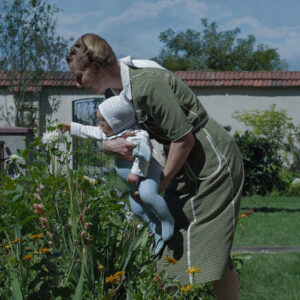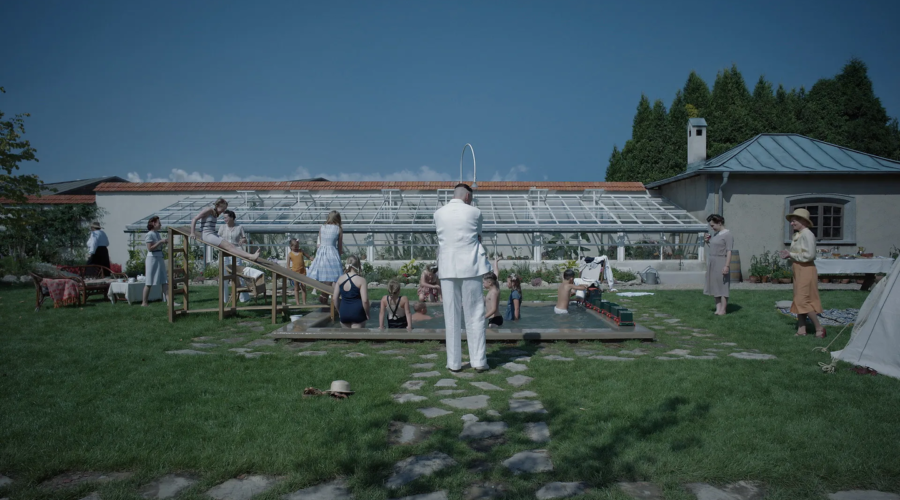Jonathan Glazer’s, The Zone of Interest exists as a title before slowly dissolving to a black screen, a lingering Kubrickian monolith transporting us back through time as only cinema can. Gothic choral voices echo and swirl, skimming across the surface of invisible water before submerging disassociated from the present, only to remerge in the past with beautiful birdsong cascading from the left of the obsidian portal akin to Derek Jarman’s Blue.
When Glazer finally grants us vision, we are in the Teutonic Garden of Eden, an SS paradise of sunlight and water held at arm’s length by time and function. We are in 1943 with Rudolf Höss the commandant of Auschwitz, his wife Hedwig and their five children. These are halcyon days for the Höss family, far from the disaster of Stalingrad or the soon-to-be catastrophic defeat at Kursk. Their concrete house with steps and Crittall screens nestles in the shadow of Auschwitz, the infernal heat and squalor so very nearly out of sight and so very nearly out of mind.
Unlike Ian McEwan’s The Cement Garden, the Höss family compartmentalise their atrocities beyond their garden walls rather than in their cellar. Whatever domestic bliss Hedwig conjures into her stolen home, the sheer scale of their sins can never be completely hidden from view. The electric fence just encroaches into the top left of a beautiful summer vista, the shadow of a tower peers through the curtains at dinner time, bombers leave vapor trails in the sky framed by the whitest of washing. Hedwig may turn the other way to inspect her dahlias, but the sheer weight of history is cyclopean and will not be contained by walls and fences.
 Eyes can be closed and views can be ignored but sound is invasive and inescapable. Johnnie Burn’s sound design was painstakingly accumulated from witness testimonies of Auschwitz survivors. The cries and screams of the prisoners punctuate the banal existence of the Höss family. Dogs bark, motorbikes idle and roar and the screech of train wheels on metal tracks, the puff of steam, and the friendly whistle herald the arrival of more innocent Jews to be exterminated. The unceasing mechanical thrum of the crematoria constantly remind the audience of the industrial scale of the slaughter. The ears work quicker than the eyes and sounds invade the subconscious in the most visceral manner.
Eyes can be closed and views can be ignored but sound is invasive and inescapable. Johnnie Burn’s sound design was painstakingly accumulated from witness testimonies of Auschwitz survivors. The cries and screams of the prisoners punctuate the banal existence of the Höss family. Dogs bark, motorbikes idle and roar and the screech of train wheels on metal tracks, the puff of steam, and the friendly whistle herald the arrival of more innocent Jews to be exterminated. The unceasing mechanical thrum of the crematoria constantly remind the audience of the industrial scale of the slaughter. The ears work quicker than the eyes and sounds invade the subconscious in the most visceral manner.
The Höss family live adjacent to the hell of their creation, the modernity of murder a stone throws away. Höss meets with engineers in his pristine house who show him plans for ever more efficient crematoria, an ever more chilling mantra, “burn, cool, unload, reload.” The plans are seen dispassionately from above; if God is watching He doesn’t care or more likely He doesn’t exist. All the major German companies have contracts tied to Auschwitz; vampiric corporations bloated on the blood of the innocent, like Siemens using forced labour to make electrical components for the Wehrmacht.
Even more blandly chilling is Hedwig’s reaction to Höss being promoted to deputy inspector of concentration camps, which will mean moving the family to Oranienburg near Berlin. Hedwig crowns herself as, “the Queen of Auschwitz” without a shred of irony and is furious with the thought of leaving her dream home and negotiates to stay with the children as part of his new job package. She swoons in her bedroom over a fur coat stolen from the corpse of its previous owner and orders her maids to repair the lining. When she reprimands a maid, she casually says, “I could have my husband spread your ashes across the fields of Babice.”
This is a woman not for turning even when her home is a concrete parasite blistered on the mechanised cadaver of what used to be the humanity of the German people.
Finally, when Höss is tasked with transporting 700,000 Hungarian Jews to work or be killed, there is a remarkable temporal distortion in our time machine. Glazer comments on the commodification, the repackaging of history no matter how momentous, monstrous, or murderous.
Does Höss see the future momentarily or does he dry heave as he descends the stairs from a Nazi function because he has no soul to spew? When Mica Levi’s terrifying score threatens to tear the screen asunder, we wonder if these are the anguished souls of the many million’s dead screaming at Höss and Hedwig as they rot in eternal damnation.

